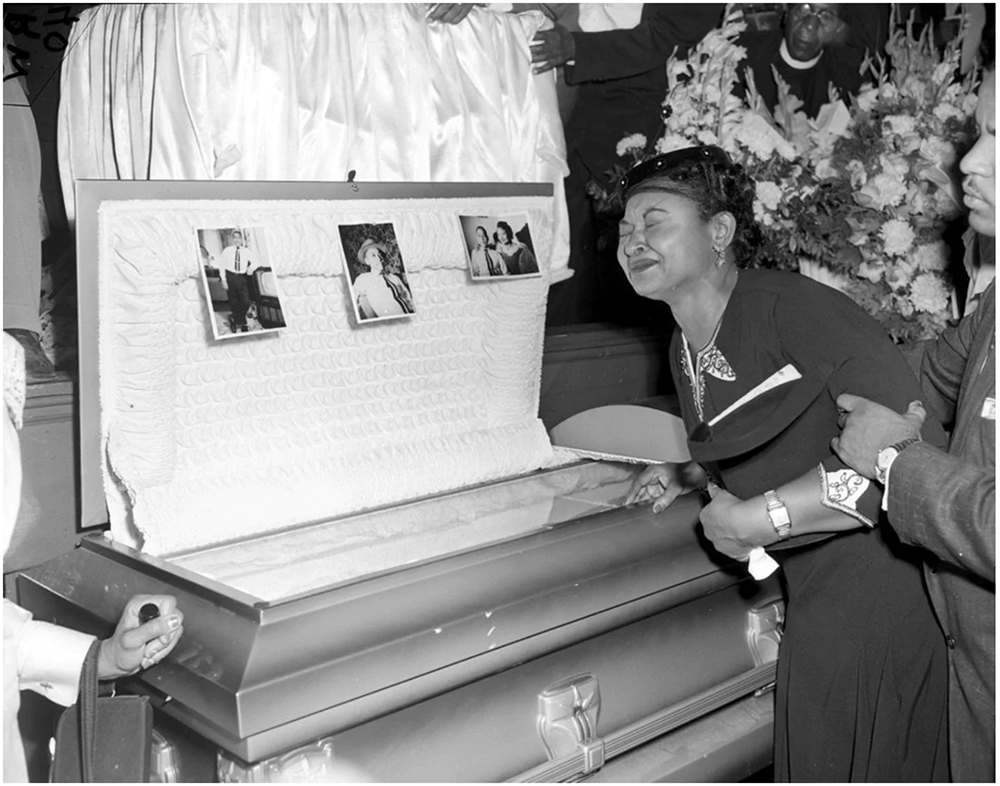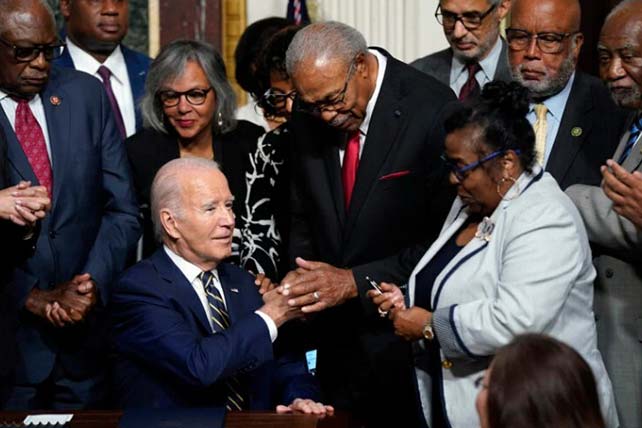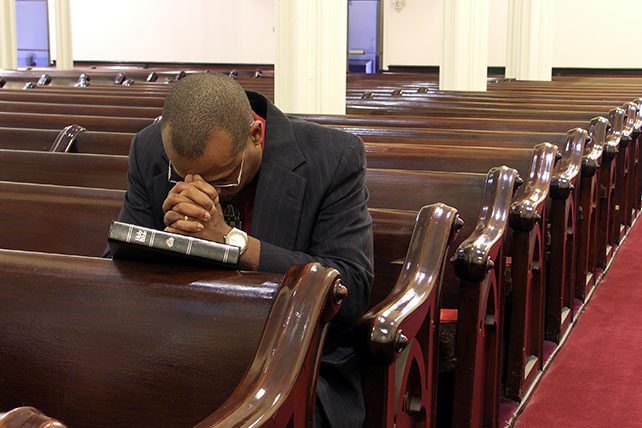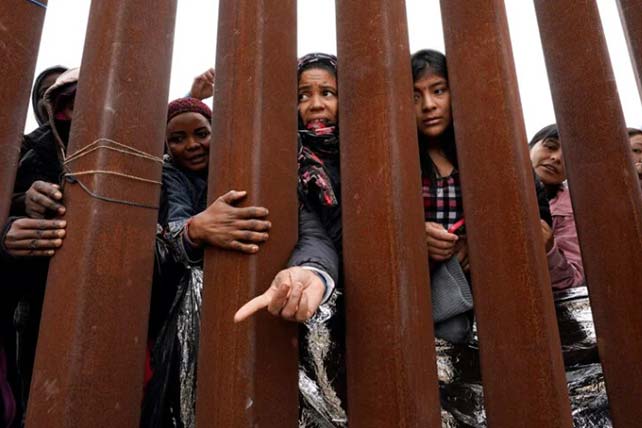WASHINGTON (RNS) — On Capitol Hill, a handful of Republican lawmakers are threatening to reduce or eliminate funding for Catholic Charities and other faith-based groups who offer aid to immigrants at the Southern border.
The members of Congress, who are echoing the campaigns of deeply conservative Catholic groups that vow to “#defund the bishops,” have already succeeded in inserting their agenda into legislation passed by the House earlier this year. Another attempt to zero-out appropriations for a key Department of Homeland Security program supporting faith-based border efforts is awaiting a vote in Congress.
In December, Republican Rep. Lance Gooden of Texas, who serves on the House Judiciary Committee, penned a letter to DHS Secretary Alejandro Mayorkas. In the letter, co-signed by Reps. Tom Tiffany of Wisconsin and Jake Ellzey of Texas, the lawmakers complained that the Biden administration was “allowing non-governmental organizations … the freedom to aid and abet illegal aliens.” In addition, lawmakers also sent letters to Catholic Charities, Jewish Family Service and Lutheran Immigration and Refugee Service demanding they preserve documents “related to any expenditures submitted for reimbursement from the federal government related to migrants encountered at the southern border.”
Contacted by Religion News Service at the time, Anthony Granado, vice president of government relations at Catholic Charities USA, said, “We have not seen such a level of direct … attack against Catholic Charities USA.”
In May, when Gooden penned another letter to Mayorkas, this time with Rep. Tom McClintock of California and Committee Chairman Jim Jordan of Ohio, they accused the NGOs that use federal funds to aid immigrants of creating an “incentive” for illegal immigration and demanded access to a broad swath of records about DHS funding practices.
Days later, Gooden published an open letter to House colleagues that accused NGOs, including faith-based groups, of abusing their tax-exempt status by “play(ing) a disturbing role in the inflow and spread of illegal immigration throughout the country.”
Gooden, who worships at a Church of Christ congregation, expressed particular frustration with FEMA’s Emergency Food and Shelter Program — which is transitioning to an effort titled the Shelter and Services Program — that reimburses NGOs and local governments for offering certain aid to migrants. He singled out a number of faith-based groups in his solo letter, such as Jewish Family Services and LIRS, but criticized Catholic Charities at length.
For his part, Tiffany recently called for Catholic Charities USA to testify before the Judiciary Committee to explain “what they’re doing down on the border to facilitate this illegal immigration,” according to Bloomberg Government.
In a phone interview last week, Lee Williams, chief programs officer for Lutheran Immigration and Refugee Service, called the lawmakers’ allegations “preposterous” and “dangerous.” He also pointed out that LIRS aids immigrants after they are processed and released from U.S. Customs and Border Protection, work that is funded by private money.
Catholic Charities, for its part, receives ample government funds annually and operates as a network of local charities. In addition to anti-poverty programs, Catholic Charities also works with immigrants — including efforts to offer humanitarian aid to migrants along the U.S.-Mexico border.
It’s work that, not long ago, Republicans in Congress nearly uniformly praised. In 2014, amid a spike in border crossings by unaccompanied minors and mothers traveling with children, a delegation of Republican lawmakers led by talk-show host Glenn Beck visited a Catholic Charities respite center based in a church in McAllen, Texas. Sen. Ted Cruz, East Texas Rep. Randy Weber and then-Rep. Louie Gohmert, among others, toured the center and, in Beck’s case, donated toys to children.
“I want to thank Catholic Charities that are working to care for these children and care for these families,” Cruz told reporters at the time.
Weber was similarly effusive, quoting Scripture while describing the center’s work as a fulfillment of “the church’s role.”
Mistrust of faith groups that work with immigrants, but in particular Catholic Charities, has been growing in right-wing circles since at least February 2022, when CatholicVote, a conservative political group, sued the Biden administration in an effort to acquire copies of “all communications between the U.S. Customs and Border Patrol” and various Catholic bishops and Catholic Charities entities — including the respite center in McAllen.
The antipathy for Catholic Charities came up again last summer, when Michael Voris, founder of the conservative Catholic website Church Militant, interviewed Rep. Marjorie Taylor Greene of Georgia, a self-described Christian nationalist and former Catholic who converted to evangelicalism. Voris, whose organization has referred to Catholic Charities as an “enemy of the people,” complained to Greene about the American bishops supporting immigrant aid through religious agencies such as Catholic Relief Services and Catholic Charities. Greene responded by framing the work as “Satan controlling the church.”
Most recently, in Washington on Thursday (July 20), members of the Deposit of Faith Coalition, a group of activists who object to the direction the U.S. Catholic bishops are taking and accuse them of “standing with Marxists,” called on Congress — and particularly appropriations committees — to stop granting contracts to the U.S. Conference of Catholic Bishops and Catholic Charities.
Addressing the crowd from a podium at the National Press Club that read “#DefundtheBishops,” Sheena Rodriguez, head of Alliance for a Safe Texas, insisted that Catholic Charities was one constellation of groups “incentiviz(ing) mass illegal migration worldwide” and “creating a modern-day slavery scheme.”
The gathering attracted only a small crowd, but their ideas have gained a footing on Capitol Hill. In April, Rodriguez was invited to testify before the House Judiciary Committee on border security, arguing that unaccompanied minors at the border were being mistreated under the Biden administration.
After her testimony, Rep. Eric Swalwell, a California Democrat, pointed out that Rodriguez was among the crowd that surrounded the U.S. Capitol when rioters attacked the building on Jan. 6, 2021, although there is no evidence Rodriguez entered the building that day. She had also taken part in the Christian nationalism-themed Jericho March at the Capitol the day before.
The movement to defund Catholic agencies also found its way into the GOP’s signature border security bill passed in May, known as the Secure the Border Act. It included a provision that would cut all funding to the Shelter Services Program.
The U.S. Conference of Catholic Bishops opposed the Secure the Border Act for multiple reasons, including how it treats DHS funding streams to NGOs. The bishops sent a letter to lawmakers urging them to vote against it. Sister Donna Markham, a Catholic nun who oversees Catholic Charities USA, also wrote a letter to congressional leadership at the time decrying the proposed cuts, saying they would “dismantle the public-private infrastructure currently in place to manage the humanitarian crisis at the southern border and its impact throughout the country.”
The bill passed the House largely along party lines, with Gooden, Tiffany and Weber all voting in favor.
The bill has little chance of passing the U.S. Senate, where Democrats enjoy a majority, but Gooden’s movement persists: Last month the House Appropriations Committee unveiled a DHS appropriations bill, which, like the border bill, eliminates funding for the Shelter and Services Program.
Markham said in a statement to RNS that the work of respite centers along the U.S.-Mexico border should be uncontroversial and invited members of Congress to tour their facilities.
“This work is humanitarian and motivated by the teachings of the gospels; it is not political, and it should not be controversial,” Markham’s statement read.
This article originally appeared here.




























